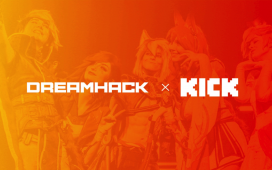Since the novel coronavirus disease (COVID-19) first emerged in Wuhan, China, in December last year, it rapidly spread globally, with currently roughly 1.8M confirmed cases in 213 countries (as of April 14). In an effort to slow down the spread, most countries released policies restricting social contacts and urging people to stay home if possible. In the wake of public life grinding to a halt, esports and gaming experienced a rapid rise in popularity as many are looking for entertainment. The second half of March saw gaming conversation volume jump 71% in comparison to the first two weeks, according to numbers released by Twitter.
Nevertheless, the esports and gaming industry isn’t immune to the economic symptoms companies worldwide are currently experiencing. No previous infectious disease outbreak (including the Spanish Flu outbreak in 1918 and 1920) has impacted the stock markets as significantly as the current pandemic due to the policy responses by most governments. In this article, we’re going to look at those companies in the esports ecosystem that are publicly traded and compare them to the general market.
Up to now, the U.S. stock market index Dow Jones Industrial Average lost 34.85% at the provisional peak of the current economic crisis. While the index only represents 30 large stock exchange-listed companies, the ongoing situation is affecting all types of businesses directly or indirectly. In the esports ecosystem, three major trends emerged as companies are trying to adapt to the current circumstances.
Trend 1- Cutting Costs
Several esports companies announced that they took measurements to cut costs of operations to counteract the loss of revenues. Team Reciprocity, which is currently looking to perform a reverse takeover (RTO) to become publicly listed on the Canadian TSXV exchange, released all staff. Toronto Defiant and Mad Lions parent OverActive Media also let up to 13 employees go.
Trend 2- Going Online
While the games played at esports competitions are natively played online, most large competitions are usually taking place at a physical location such as an arena or a studio. Due to the COVID-19 policies and to protect everyone typically involved in the production of leagues and tournaments, most of those formats have been transformed into online events.
Counter-Strike: Global Offensive developer Valve and esports organizer ESL announced an online competition called “ESL One: Road to Rio,” which will be the official qualifier for the Counter-Strike: Global Offensive Rio de Janeiro Major in November. Another Counter-Strike: Global Offensive format that was moved to an online format is the DreamHack Masters, which was scheduled to take place in Jönköping, Sweden.
Furthermore, most long-format esports leagues such as the Overwatch League, Call of Duty League, and all League of Legends regional championships such as the League of Legends European Championship (LEC), League of Legends Championship Series (LCS), League of Legends Champions Korea (LCK), and League of Legends Pro League (LPL) have adapted an online format as well.
Trend 3 – Sports Joining In
Just as most esports competitions went online for the time being, they were joined by several sports organizations, which turned to gaming competitions and exhibitions to fill the void of sports events.
NBA organization Phoenix Suns decided to continue its regular season schedule by simulating the games in Take-Two Interactive’s NBA 2K game, which the team streams on Twitch. The motorsports organizer Formula 1 established a racing simulation series in place of its regular schedule in which a number of F1 and other motorsports drivers are participating. Additionally, a large number of different sim-racing competitions emerged in recent weeks seeing the participation of racing drivers, athletes, and celebrities, including a multirace exhibition by NASCAR, which is broadcasted on linear TV station FOX Sports.
COVID-19 Is Forcing Markets to Adjust
In general, many entities in the esports ecosystem proved to be capable of adjusting their business operations to the new situation as several of the industry’s niches outperformed the overall market since the end of January when the first cases of COVID-19 started spreading into the western world.
The esports industry is not benefitting from the situation across the board as companies have to deal with the repercussions such as establishing remote work, lack of live-events, fewer sponsorships and media rights sales opportunities, and more. The recent weeks showed that the esports industry is one of the few that by the nature of its infrastructure and product has the possibility to adjust to the current situation, which led to a few players within the industry being able to profit from the current global situation and off certain developments in other industries, especially the sports and entertainment industry.
Nevertheless, certain categories within the esports ecosystem are facing massive struggles such as tournament organizers and esports venue operators as they performed significantly worse than the general market in recent weeks. In addition, many not publicly-traded esports companies, especially startups, are facing existential threats, including a lack of available risk capital.
The Outperformers – Lockdowns Boosting Gaming
Following the widespread establishment of governmental guidelines and rules enforcing social distancing, the stop of culture and sports events, the closure of restaurants, retail stores, etc., the demand for gaming as a form of entertainment vastly increased. Reportedly, people are spending 39% more on their gaming hobby currently. Additionally, game developers also profited from a significant increase in media interest in gaming since policies restricted public life.
Several game developers, such as Activision Blizzard, Electronic Arts, and Ubisoft Entertainment, announced in their annual earnings report that they are expecting increased player numbers and revenues due to the COVID-19 situation.
The stocks considered for the game developers category are Activision Blizzard (ATVI), Take-Two Interactive Software (TTWO), Electronic Arts (EA), Capcom (9697.T), Konami Holdings (9766.T), Ubisoft Entertainment (UBI.PA), and Nexon (3659.T).
Another category within the esports ecosystem that is benefitting from the effects of COVID-19 policies is live streaming. As people are trying to entertain themselves with few options available, many turned to watching live streams.
According to the quarterly live-streaming industry report from StreamLabs and Stream Hatchet, Twitch, YouTube, and Facebook all saw Q1 2020 quarter-over-quarter lifts in viewership, with Twitch surpassing 3B hours watched in a single quarter for the first time.
After factoring in the full impact of COVID-19, Chinese live streaming platform Huya expects its revenues for the first quarter of 2020 to increase by 45% to 47% year-over-year and representatives stating that the lockdowns and winter vacation in China boosted engagement rates on its platform.
The stocks considered for the live-streaming category are Huya (HUYA), DouYu International Holdings (DOYU), and AfreecaTV (067160).
The current changes in lifestyle caused by COVID-19 policies resulted in short-term increased demand for gaming-related products such as PC components and peripherals. Gaming hardware manufacturer Razer reported that it expects to see more opportunities and growth for its gaming ecosystem due to the “stay-at-home” situation.
The stocks considered for the manufacturers category are Logitech International (LOGI), Turtle Beach (HEAR), RAZER (1337.HK), ACER (2353.TW), ASUSTEK Computer (2357.TW), Micro-Star International (2377.TW), NVIDIA (NVDA), and Advanced Micro Devices (AMD).
Some of the most prominent players in the esports industry are broad portfolio companies such as Tencent, which is invested in several game developers, esports tournament organizers, and live streaming platforms. Those companies outperformed the general market significantly since late January.
In March, Tencent stated that it expects revenues from its gaming business to help weather the COVID-19 situation as the millions of people in China self-isolating at home spent an increasing portion of their time on the company’s gaming, music, and online reading services.
The stocks considered for this category are Tencent Holdings (TCEHY), NetEase (NTES), and Sea (SE).
The Underperformers – Imploding Revenues
While several publicly-traded esports and gaming companies outperformed the general market, publicly-traded esports organizations mostly suffer from COVID-19 policies as monetization opportunities became scarce.
Astralis, Origen, and Future FC parent Astralis Group had to reduce operational costs to secure liquidity. The company announced that its management, employees, and most players entered a voluntary agreement to reduce salaries by up to 30% based on salary size.
Unlike the other two companies considered for the teams category, Astralis’ sole business purpose is owning and managing esports teams. Enthusiast Gaming and Simplicity Esports and Gaming have several products aside from the teams they own. Consequently, Astralis experienced the worst stock performance out of the three companies.
 Enthusiast Gaming CEO Adrian Montgomery said that his company ended 2019 with $9.24M in cash, which could serve as short-term liquidity in case the company experiences negative impacts from the current global health crisis.
Enthusiast Gaming CEO Adrian Montgomery said that his company ended 2019 with $9.24M in cash, which could serve as short-term liquidity in case the company experiences negative impacts from the current global health crisis.
The stocks considered for the teams category are Astralis Group (ASTGRP.CO), Simplicity Esports and Gaming (WINR), and Enthusiast Gaming Holdings (EGLX.TO).
Esports competition stocks took the most direct hit from COVID-19 policies. Allied Esports Entertainment’s HyperX Esports Arena Las Vegas was shut down for the time being and Torque Esports’ esports racing arena in Miami, which was initially scheduled to open in Spring, will likely not be opened anytime soon.
All current significant esports tournaments with live audiences have either been canceled, postponed, or moved to an online format. Therefore, organizers are missing out on ticketing, concessions, media rights, and sponsorship revenues.
ESL and DreamHack parent MTG expects its revenues in the esports vertical, which accounted for 40% of the group’s 2019 2019 revenues, to decrease by 35% to 45% in the first half of 2020 compared to the same period of 2019. The company primarily sees the cause for this decline in a variety of government policies to contain the global outbreak), which had a significant impact on its esports vertical as it is built around live events revenues from media rights, brand partnerships, ticketing, and merchandise sales.
The stocks considered for this category are Allied Esports Entertainment (AESE), Modern Times Group MTG (MTG-B.ST), Gfinity (GFIN.L), and Torque Esports (GAME.V).
A Brief Look at Esports ETFs
As industry-focused exchange-traded funds (ETFs) often represent the general development of an industry, we briefly looked into the two ETFs focusing on esports and gaming. Since the beginning of the effects of COVID-19 rendering themselves noticeable on the stock markets, the esports and gaming industry, as represented by the ETFs, outperformed the general market. Especially in the initial recovery phase since March 16, the industry seems to have a significant advantage over the general market.
The ETFs considered for this category are the Roundhill BITKRAFT Esports & Digital Entertainment ETF (NERD) and the VanEck Vectors Video Gaming and eSports ETF (ESPO).
Disclaimer: The publicly traded companies looked at for this article do not represent the esports ecosystem perfectly. For example, they do not reveal how small companies and startups are able to adjust to the crisis, regional differences, and scaling effects. If you are interested in the specific stock data used for this article, you can check out the data model The Esports Observer built.
























